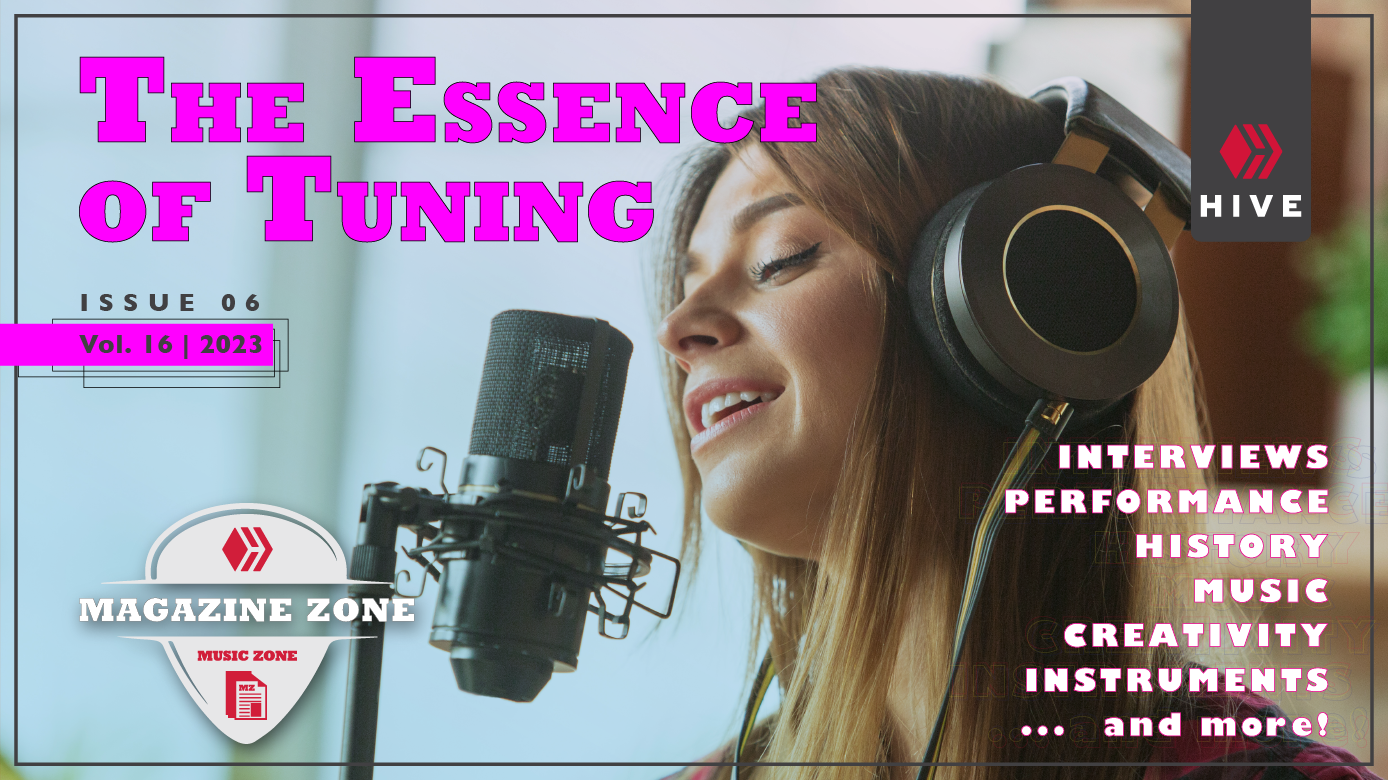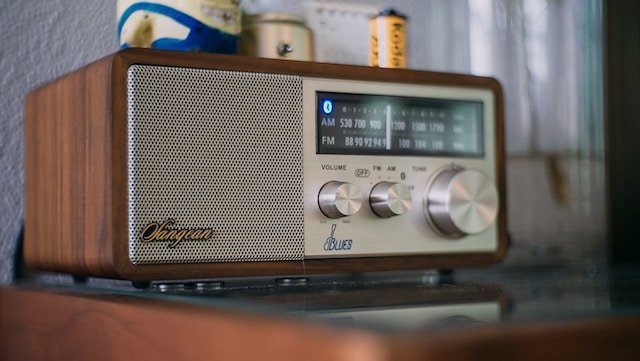Magazine Zone: The Essence of Tuning || Issue 06 - Vol. 16 [ENG-ESP]

The essence of tuning
La esencia de la afinación
Singing has always been seen as something complex and the most delicate of music, a skill that not everyone dares to travel to learn to sing. Fear is one of the most crucial factors that we must overcome, it seems easy, but when you approach the process is not so much. Singing, as well as the rest of music, should be enjoyed and not cause any fear, but the reality is that this feeling is complex and involves some causes that we must identify in order to advance in the process. Any skill that we want to learn is essential to know ourselves during the learning process, there are life events that block us, we pass it unnoticed and do not let us move forward. The intonation is one of the causes of that fear, to sing being out of tune is an experience that is difficult to face, to hear oneself out of the right intonation is something complex to assume within us.
El canto siempre se ha visto como algo complejo y lo más delicado de la música, una habilidad que no todo el mundo se atreve caminar el viajar para aprender a cantar. El miedo es uno de los factores más cruciales que debemos vencer, parece fácil, pero cuando abordas el proceso no lo es tanto. El canto, así como el resto de la música, debe disfrutarse y no causar miedo alguno, pero la realidad, es que este sentimiento es complejo e involucra algunas causas que debemos identificar para lograr avanzar en el proceso. Cualquier habilidad que queramos aprender es primordial conocerse a sí mismo durante el proceso de aprendizaje, existen eventos de vida que nos bloquea, lo pasamos desapercibidos y no nos dejan avanzar. La afinación es una de las causas de ese miedo, cantar estando desafinado es una experiencia que cuesta afrontarla, escucharse fuera de la entonación adecuada es algo complejo de asumir dentro de nosotros.



Todos ser humano tiene un aparato fonador, es lo común que tenemos entre todas las personas, sin embargo, hay personas que cantan y otras que no. Cualquier miedo, el que sea que tengamos, se vence haciéndole frente, luchar contra ello es la vía para superarlo, sabiendo que el éxito está después de ese sentimiento, y para estar del otro lado solo hay que atravesarlo. Para empezar, es bueno saber que cantar desafinado no es más que entonar la voz fuera de cualquiera sincronización de las notas musicales que nos acompañan. La habilidad de entonar adecuadamente la voz al cantar es primordial; es uno de los elementos vitales para una interpretación armoniosa, de allí, la importancia de la afinación y del entrenamiento auditivo.

Source | Fuente
Mejorar tu Oído Musical
Improve your Musical Ear



Entrenar el oído musical es el fundamento para cantar afinado. La voz, cómo cualquier otro instrumento, para ejercitarla se necesita un entrenamiento auditivo, desarrollar el oído musical de manera que podamos reconocer las notas es lo primero que debemos estudiar para lograr cantar de forma afinada. Escuchar mucha música es muy importante, así como también identificar lo que suena en cada uno de los instrumentos que escuchamos, eso nos aporta en gran medida. Hacer ejercicios para desarrollar el oído también nos ayuda mucho para que el cerebro se entrene, lo que sucede aquí es que se va creando memoria de cada sonido, que al momento de cantar vamos reconociendo.
Es importante que podamos entrenarnos para cantar de manera afinada, la desafinación o estar fuera del tono produce mucha desesperación y estresa a cualquier cantante, aunque hay quienes se lo disfrutan y hasta rien de ellos mismo, cosa que debemos aprender porque lo importante es disfrutarse el proceso de aprender y reconocer los pequeños avances. Es normal que a algunas personas se les haga más fácil que a otras, no es indicativo si de verdad tenemos la intensión de aprender. Cantar afinado no es solo algo que se limita a la voz única, es muy importante tener el control del cuerpo y de nuestros pensamientos.



Por lo regular, los factores que nos hacen desafinar están fuera de la voz y del aparato fonador como tal. La postural corporal y la respiración son clave para mantener una afinación adecuada, pero también la memoria musical y la concentración nos aportan, todo el conjunto nos ayuda a entonar de la mejor manera. Cada aspecto nos ayuda por separado en áreas específicas para conseguir en conjunto los resultados que deseamos. Por un lado, preparamos el cuerpo y la concentración, y, por otro lado, aseguramos que la expresión vocal esté relajada y no nos genere agotamiento. Pero por sobre todas las cosas, necesitamos mucha actitud y ganas de aprender.

Source | Fuente
Practicar de manera diaria es muy importante, crear un hábito y rutinas de entrenamiento nos ayuda a tener confianza en nuestra propia voz. Tampoco necesitamos aprenderlo todo para empezar a cantar, el canto es uno de los instrumentos que más años lleva en entenderlo y estudiarlo. Debemos tenernos paciencia y disfrutar del proceso, pero sobre todo disfrutar de la música y de como lo hacemos. No debe haber sufrimiento para cantar afinado, tampoco debe haber dolor. En la medida que la pasemos bien cantando lo haremos mejor cada vez.

A word from Jesús
Unas palabras de Jesús
 Por: Jesús Tortolero | @yisusth
Por: Jesús Tortolero | @yisusth
If you have had the opportunity to tune into an old radio, you may notice that precision and accuracy are needed to select and lock onto the frequency of a desired station. When the message is clear, strong, and harmonious, then we have found it successfully. Both those who play a musical instrument and those who sing need to accurately and tune the notes they play. Some instruments such as the violin or the trombone require accuracy in the positions, the challenge of these instruments is that they do not have frets or marks that indicate where the fingers or positions should be placed. Tuning has to do with the information you have in your mind. Some people have perfect pitch, meaning they can hear a note and know its name, or they can sing a specific note without any reference. It is a skill of 1 in 10 thousand people. Early musical training can help to be in tune. In some communities, we can hear people very tuned because they are exposed to music for a long time. Tuning can be a challenge if you have problems with your oral health or problems with your voice and hearing. In those cases, it is important to see a specialist or speech therapist to have a diagnosis. Today I'm sharing some tips that will help you tune up when singing or playing a musical instrument.
Si han tenido la oportunidad de sintonizar una vieja radio, podrán notar que se necesita precisión y exactitud para seleccionar y ajustarse a la frecuencia de una emisora deseada. Cuando el mensaje es claro, fuerte y armonioso, entonces la hemos encontrado con éxito. Tanto aquellos que tocan un instrumento musical como los que cantan necesitan sintonizar con precisión y claridad las notas que interpretan. Algunos instrumentos como el violín o el trombón requieren exactitud en las posiciones, el reto de estos instrumentos es que no tienen trastes o marcas que indiquen donde deben colocarse los dedos o las posiciones. Afinar tiene que ver con la información que posees en tu mente. Algunas personas tienen Oído absoluto o tono perfecto, es decir, pueden escuchar una nota y saber su nombre, o puede cantar una nota específica sin ninguna referencia. Es una habilidad de 1 de cada 10 mil personas. El entrenamiento musical temprano puede ayudar a ser afinado. En algunas comunidades podemos escuchar a personas muy afinadas porque están expuestos a música por mucho tiempo. Afinar puede ser un reto si tienes problemas con tu salud bucal, o trastornos con la voz y el oído. En esos casos si es importante asistir a un especialista o foniatra para tener un diagnóstico. Hoy les comparto algunos consejos que les ayudarán a afinar al momento de cantar o tocar un instrumento musical.
Do vocal exercises that include singing major scales and then going through minor scales. These scales can be ascending or descending. You can perform vocal arpeggios, a succession of notes of a triad or chord consecutively. You can also train in intervals, a type of vocal training that involves singing two notes a specified distance apart. This can help you improve your ability to identify and sing specific pitches. Someone can play those notes on a piano, or another instrument, and then you can reproduce them with your voice, and identify the notes, or the distance of the interval. Like any muscle, the vocal apparatus needs warming up. Warming up the voice helps loosen the vocal cords and improve the vocal range. There are many exercises to prepare, from relaxation exercises, breathing, intonation, diction, and pronunciation.
Haz ejercicios de vocalización que incluyan cantar escalas mayores y luego pasar por escalas menores. Estas escalas pueden ser ascendentes o descendentes. Puedes realizar arpegios vocales, una sucesión de notas de una tríada o acorde consecutivamente. También puedes entrenar intervalos, un tipo de entrenamiento vocal que consiste en cantar dos notas separadas por una distancia específica. Esto puede ayudarte a mejorar tu capacidad para identificar y cantar tonos específicos. Alguien puede tocar esas notas con un piano, u otro instrumento, y luego puedes reproducirlas con la voz, identificar las notas, o la distancia del intervalo. Como cualquier músculo, el aparato fonador necesita de calentamiento. Calentar la voz ayuda a aflojar las cuerdas vocales y mejorar el rango vocal. Hay muchos ejercicios para prepararse, desde ejercicios de relajación, respiración, entonación, dicción y pronunciación.
La práctica hace el maestro, pero debes tener en cuenta que no debes exigirte más de lo que las fuerzas te permitan. Establece una rutina de 30 o 40 minutos diarios para practicar. Puedes usar un afinador para ayudarte a cantar afinado tocando una nota en el afinador y luego tratando de hacer coincidir su voz con el tono que está tocando el afinador. Intenta escucharte a ti mismo, puedes grabarte cantando, escuchar y luego realizar ajustes. También debes considerar practicar tu oído rítmico al escuchar diferentes esquemas o patrones rítmicos y repetirlos con tu voz o instrumento. Un entrenador vocal puede ayudarte a identificar y corregir cualquier problema con tu tono. Por último, Se necesita tiempo y práctica para desarrollar una buena afinación. No te desanimes si no ves resultados inmediatamente. Solo sigue practicando y eventualmente verás mejoras.


Previous volumes
Volúmenes anteriores
Issue 01 | Edición 01
 | Editorial -Vol. 01 |
|---|---|
 | Interview with Jasper Dick - Vol. 02 |
 | The Musical Language Evolves - Vol. 03 |
Issue 02 | Edición 02
 | Women's Musical Props - Vol. 04 |
|---|---|
 | Elements of music - Vol. 05 |
 | Digital Dialogue with Nahu Padilla - Vol. 06 |
Issue 03 | Edición 03
 | Musical Performance - Vol. 07 |
|---|---|
 | Musical melody - Vol. 08 |
 | Musical Rhythm - Vol. 09 |
Issue 04 | Edición 04
 | Musical Harmony - Vol. 10 |
|---|---|
 | Musical Branding - Vol. 11 |
 | Visual Identity for Musicians - Vol. 12 |
Issue 05 | Edición 05
 | For Practice Visual & Musical - Shakira "Acróstico" - Vol. 13 |
|---|---|
 ) ) | Performance in House - Vol. 14 |
 ) ) | Social Impact of Music - Vol. 15 |

🔸


Delega en la cuenta @musiczone, y ayuda a recompensar a los autores con un mayor voto.
Aquí algunos enlaces para delegar usando Hivesigner
Delegate to the @musiczone account, and help reward authors with a higher vote.
Here are some links to delegate using Hivesigner

We invite you! | Te invitamos
Music Zone
©2023 - Todos los derechos reservados
©2023 - Todos los derechos reservados









Seguimos dando un aporte significativo a todos los artistas que participan en el Hive Music Festival, a todos los músicos tanto amateurs como profesionales dentro y fuera de la Blockchain de Hive. Esperamos que cada volumen sea inspirador y brinde herramientas para seguir mejorando. En el pentagrama de la vida es necesario afinar y sintonizar con la frecuencia correcta. Aquí encontrarán algunos consejos para cantar de manera agradable y armoniosa. No te lo pierdas.
(Antes de todo, queremos pedir nuestras mas sinceras disculpas por no poder responder a tiempo)
Jesús, agradecemos tus aportes para el crecimiento y la evolución de todos los participantes en el Hive Music Festival, aunque también, sabemos que esto se extiende a toda la Blockchain. Muchas gracias por el tiempo que le imprimes al magazine. Saludos
Congratulations @musiczone! You have completed the following achievement on the Hive blockchain And have been rewarded with New badge(s)
Your next target is to reach 60 posts.
You can view your badges on your board and compare yourself to others in the Ranking
If you no longer want to receive notifications, reply to this comment with the word
STOPTo support your work, I also upvoted your post!
Check out our last posts:
Do you want to get involved? Do you want to support music and this project? Follow us to keep you updated and read our Introduction post!
🎶 Join us on our Discord Server! 🎵